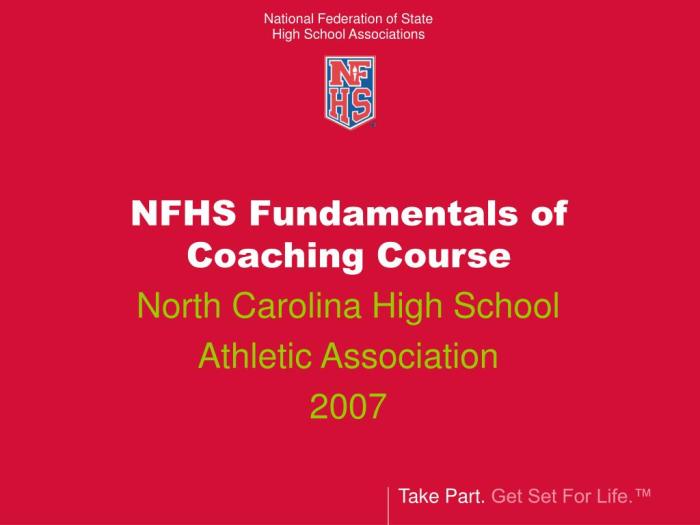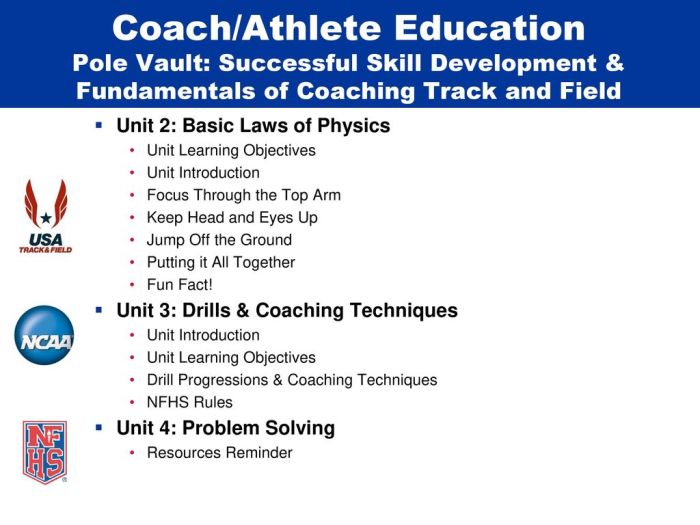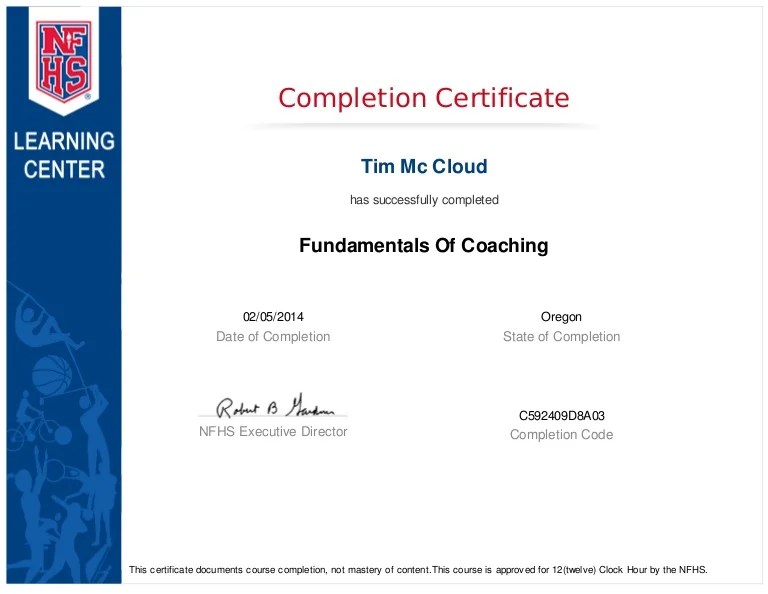Welcome to our in-depth exploration of NFHS Fundamentals of Coaching Unit 2 Answers. This comprehensive guide delves into the intricacies of coaching principles, communication strategies, planning techniques, safety protocols, ethical considerations, and various coaching styles. Get ready to enhance your coaching skills and elevate your athletes’ performance to new heights.
Throughout this guide, we will provide practical examples, insightful tips, and thought-provoking discussions to help you master the art of effective coaching. Whether you’re a seasoned coach or just starting your journey, this guide will serve as an invaluable resource for your professional development.
Coaching Principles
Effective coaching is grounded in fundamental principles that guide coaches in their interactions with athletes. These principles include creating a positive and supportive environment, fostering open communication, setting clear goals and objectives, and prioritizing safety and risk management. Understanding and applying these principles is essential for building successful coaching relationships and maximizing athlete development.
Importance of Creating a Positive and Supportive Coaching Environment
- Promotes athlete confidence and well-being
- Fosters a sense of belonging and community
- Encourages athletes to take risks and challenge themselves
Effective Coaching Techniques
- Active listening: Paying full attention to athletes’ perspectives and understanding their needs
- Positive reinforcement: Recognizing and rewarding athletes’ efforts and accomplishments
- Goal setting: Establishing clear and achievable goals that motivate athletes
- Feedback: Providing constructive criticism and guidance to help athletes improve
Communication and Feedback

Effective communication is crucial for successful coaching. Coaches must be able to convey their message clearly and concisely, while also creating a space for athletes to express their thoughts and feelings. Constructive feedback is essential for athlete development, as it provides specific guidance on areas for improvement.
Strategies for Giving Constructive Feedback
- Be specific and objective: Focus on specific behaviors or actions rather than making general statements.
- Use “I” statements: Take ownership of your feedback by using “I” statements to express your perspective.
- Offer suggestions for improvement: Provide practical suggestions on how athletes can improve their performance.
Role of Active Listening in Coaching
- Builds rapport and trust between coaches and athletes
- Allows coaches to gain a deeper understanding of athletes’ perspectives
- Helps athletes feel valued and respected
Planning and Organization

Effective planning and organization are essential for successful coaching. Coaches must be able to create a structured and efficient training program that meets the needs of their athletes. Setting clear goals and objectives provides a roadmap for athlete development, while effective time management ensures that all necessary tasks are completed.
Importance of Setting Goals and Objectives
- Provides a clear direction for training and development
- Motivates athletes to work towards specific targets
- Allows coaches to track progress and make adjustments as needed
Successful Planning and Organization in Coaching
- Creating a detailed training schedule that Artikels workouts, rest days, and competitions
- Setting up a system for tracking athlete progress and performance
- Allocating time for athlete feedback and development
Safety and Risk Management
Safety is paramount in coaching. Coaches must create a safe environment for their athletes and take all necessary steps to minimize the risk of injury. Effective risk management involves identifying potential hazards, implementing safety protocols, and providing proper supervision.
Importance of Safety in Coaching
- Protects athletes from physical harm
- Creates a positive and supportive environment
- Builds trust between coaches and athletes
Strategies for Managing Risk in Coaching, Nfhs fundamentals of coaching unit 2 answers
- Conducting thorough risk assessments to identify potential hazards
- Developing and implementing safety protocols to mitigate risks
- Providing proper supervision and instruction to athletes
Ethics and Values

Ethical considerations are an integral part of coaching. Coaches must adhere to ethical guidelines and values to ensure that their actions are in the best interests of their athletes. Respect, integrity, and fairness are fundamental principles that guide ethical coaching practices.
Importance of Adhering to Ethical Guidelines
- Protects the well-being of athletes
- Maintains the integrity of the sport
- Builds trust between coaches, athletes, and the community
Ethical Dilemmas in Coaching
- Balancing the desire to win with the well-being of athletes
- Dealing with conflicts of interest
- Responding to unethical behavior from athletes or other coaches
Coaching Techniques: Nfhs Fundamentals Of Coaching Unit 2 Answers
There are a variety of coaching techniques that can be used to enhance athlete development. These techniques include positive reinforcement, goal setting, feedback, and active listening. Each technique serves a specific purpose and can be adapted to meet the needs of individual athletes.
Benefits and Limitations of Different Coaching Techniques
| Technique | Benefits | Limitations |
|---|---|---|
| Positive reinforcement | Motivates athletes, builds confidence | Can lead to over-reliance on rewards |
| Goal setting | Provides direction, motivates athletes | Can be unrealistic or overwhelming |
| Feedback | Helps athletes improve, builds trust | Can be perceived as criticism |
| Active listening | Builds rapport, allows athletes to express themselves | Can be time-consuming |
Coaching Styles
Different coaching styles can be effective depending on the athlete, sport, and situation. Some common coaching styles include authoritarian, democratic, and laissez-faire. Each style has its own advantages and disadvantages, and coaches should adapt their style to meet the needs of their athletes.
Successful Coaching Styles in Different Sports
- Authoritarian: Effective in high-risk sports or with athletes who need strict guidance
- Democratic: Encourages athlete participation and feedback, suitable for experienced athletes
- Laissez-faire: Provides minimal guidance, suitable for highly skilled and motivated athletes
Motivation and Inspiration
Motivation is essential for athlete success. Coaches can use a variety of strategies to motivate their athletes, including building relationships, setting challenging goals, and providing positive feedback. Inspiration can also play a powerful role in motivating athletes to achieve their full potential.
Effective Motivational Techniques
- Building relationships with athletes: Establishing trust and rapport
- Setting challenging goals: Providing athletes with something to strive for
- Providing positive feedback: Recognizing and rewarding athletes’ efforts
- Sharing inspiring stories: Connecting athletes to the broader purpose of their sport
Evaluation and Assessment
Evaluating and assessing coaching effectiveness is crucial for continuous improvement. Coaches can use a variety of methods to evaluate their own performance, including self-reflection, athlete feedback, and external evaluations. Ongoing feedback and improvement are essential for ensuring that coaches are providing the best possible support to their athletes.
Successful Evaluation and Assessment Strategies
- Self-reflection: Regularly evaluating one’s own coaching practices
- Athlete feedback: Gathering input from athletes on their experiences
- External evaluations: Seeking feedback from peers, supervisors, or mentors
- Data analysis: Tracking athlete performance and progress over time
Frequently Asked Questions
What is the primary goal of the NFHS Fundamentals of Coaching Unit 2?
To provide coaches with a comprehensive understanding of the core principles and practices of effective coaching.
How does the guide emphasize the importance of communication in coaching?
It highlights the significance of active listening, constructive feedback, and effective communication strategies for building strong coach-athlete relationships and fostering a positive team environment.
What are some key safety considerations addressed in the guide?
It emphasizes the importance of creating a safe and supportive practice environment, implementing risk management protocols, and adhering to safety guidelines to prevent injuries and ensure the well-being of athletes.
How does the guide assist coaches in developing their coaching style?
It discusses different coaching styles, their effectiveness, and how to adapt them to suit the needs of individual athletes and specific coaching situations.
What is the role of evaluation and assessment in the coaching process?
The guide stresses the importance of ongoing evaluation and assessment to measure coaching effectiveness, identify areas for improvement, and ensure continuous professional development.